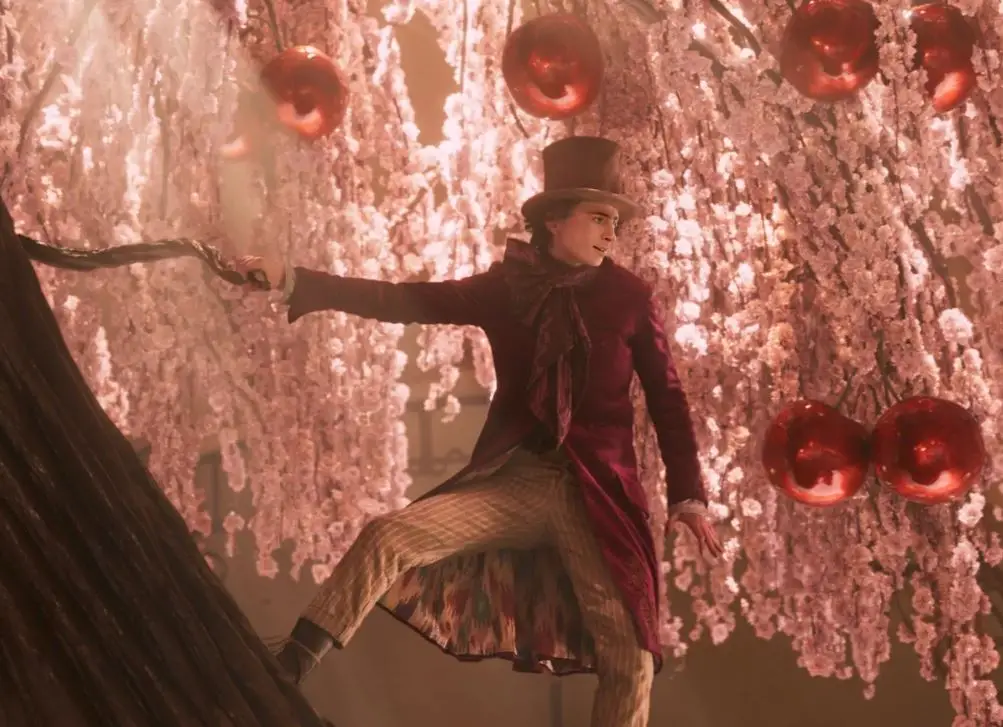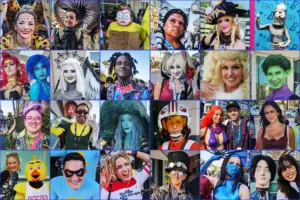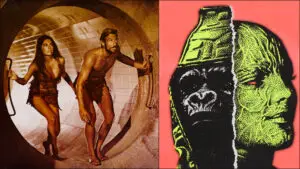In a way, I’m glad there were a number of early negative reviews of 2023’s Wonka, because I walked into the movie theater with expectations low enough for an Oompa Loompa to do yoga on.
I plunked down my golden-ticket money anyway, because Wonka is directed by Paul King, whose talking-bear Paddington and Paddington 2 were sweeter than platefuls of sugar cubes doused with English tea. I ended up pleasantly surprised with how easily Wonka rose above worry, much like Charlie after drinking the Fizzy Lifting Drink in 1971’s Willy Wonka & the Chocolate Factory.
Turns out I’d inadvertently missed the majority of positive reviews, only seeing the curmudgeonly critics who turned up their noses like impetuous Veruca Salts. Down the chute with those bad eggs!
But first, let’s talk Timothée Chalamet. Why is my first instinct to resent him? He’s Paul Atreides in 2021’s Dune: Part One, and will soon fulfill his messianic destiny as the Kwisatz Haderach in 2024’s Dune: Part Two. Isn’t that enough for an actor? Does he have to win over both the Fremen and the Oompas? Must sugar flow along with Spice? Between the “weirding way” and the Wonka way, pick a lane, buddy.
I looked within my heart and realized that Chalamet’s Backpfeifengesicht, or Resting Snoot Face, is a mirage: He’s actually a terrific Wonka. Though nobody could ever hope to approach or approximate Gene Wilder’s sublimely kindness-tumbling-over-craziness-then-back-again performance in the 1971 classic, Chalamet doesn’t try. He channels the composure and deftness of an innocent, underdog Wonka, letting the story’s positive spirit come to him. It works like sprinkles sticking to icing, powdered sugar to jelly donut, gob to stopper. Chalamet’s okay.
On a side note, through a series of shock treatments, I’ve almost entirely erased Tim Burton’s 2005 Charlie and the Chocolate Factory from my brain. Did that movie happen? All I recall is that Johnny Depp avoided unfavorable comparison to Gene Wilder by erring hard toward…some sort of circus-clown squirrel voice. I always thought Burton should have cast Nicolas Cage as Wonka (which makes vastly more sense than their near-collaboration with Cage as Superman), but it probably wouldn’t have helped. Like me, 2023’s Wonka also pretends the 2005 Charlie movie didn’t happen.
That hurdle crossed, Wonka‘s origin story feels like Paddington‘s, in a mildly derivative way. The top-hatted, purple-coated Wonka arrives at an unnamed European (yet London-feeling) city on boat, having explored far-flung areas of the world, ala Candide or Benjamin Button. He’s accumulated a suitcase full of recipes, tinctures and contraptions for making candy so potent as to draw out physical reactions (ala Like Water for Chocolate) or happy childhood sensations (ala the cuisine in Ratatouille). Wonka wants to open his own shop, but his haphazardly generous nature quickly drains his pockets, so he becomes a street vendor at the hub of the city’s three dominant chocolatiers.
Wonka, like its predecessors, has several musical numbers, which normally would make me gag, but the songs are refreshingly brief, clever, segue-smooth, and plot-propulsive. Writer-director Paul King, co-writer Simon Farnaby, and composer Neil Hannon turned my usual “Oh no, here comes a song” response into “Why yes, I’ll accept another song.” Though none of the songs approach 1971’s goosebump-worthy “Pure Imagination” (by Anthony Newley and Leslie Bricusse), the highlight song “A World of Your Own” is perfectly tolerable, and from me that’s an endorsement.
Among other songs is “Scrub Scrub,” an upbeat answer to the story’s downbeat early developments, as Willy Wonka signs a contract (he fails to read the small print, one of many callback riffs on the original) that turns him into a debt slave at a boarding house, where he does basement laundry work alongside five other captives. Among the charming cast is Jim Carter, whom Downton Abbey fans will recognize as that show’s head of the serving staff, and Calah Lane, the urchiny young woman who helps Wonka escape to hawk sweets on the sly.
The story keeps unfolding agreeably, its best quality that it honors the morality-tale underpinnings of the original while sidestepping the sadistic edge. There are barely any imperilled children in “Wonka,” let alone Gloopy ones sucked up tubes. The villains are colluding businessmen with names like Fickelgruber and of course Slugworth (played with fine-tuned quirk by Paterson Joseph), a progressively gluttony lawman (Keegan-Michael Key), and the wonderfully mean Olivia Colman as a conniving innkeeper with a Bluto-like enforcer played by Tom Davis.
Sure, a few characters might change color ala Violet Beauregard, but the film frequently chooses punch-drunk love over punishment, wherever possible tying its many colorful threads into whimsical bows, with a magician’s finesse. Goodfolk get rewards and baddies face consequences, but nobody is summarily rolled away or dropped into the incinerator. A song’s lyrics poke knowing fun at the repetitive tsk-tsk-ing of the original Oompa Loompa songs, the likes of which Wonka spares us.
Yes, of course there’s an orange-faced, green-haired manikin in the mix, played by Hugh Grant, who effectively harnesses his chewy grumpy center. I’ve read critiques of the original Roald Dahl story because the Loompaland backstory mirrors colonial exploitation of native societies, and Wonka wants none of that. Eventually Grant’s character, who’s been following Willy to take back plundered natural ingredients, develops a begrudging respect for his target. You’ve heard of deus ex machina? Get ready for deus ex Loompa.
On the pro-Dahl side, Wonka honors the author’s legacy (troubled though some aspects are) with subplots about literacy and libraries. These and other elements roll along merrily like a gumball down the spiral of a vending machine. The substantial plot moves with linear economy: If you see a colorful bundle of helium balloons, you know someone will soon commandeer them on an upward axis.
Meanwhile small characters keep emerging like different flavors in a sampler box of chocolates. The movie-theater crowd I was with started laughing just at the sight of Rowan Atkinson, playing a twitchy priest who accepts chocolate bribes in a confessional booth. Even a couple of throwaway characters, tricked into drunk-dialing each other, have an unexpectedly heartwarming ending. Hooray for Wonkavision.
















